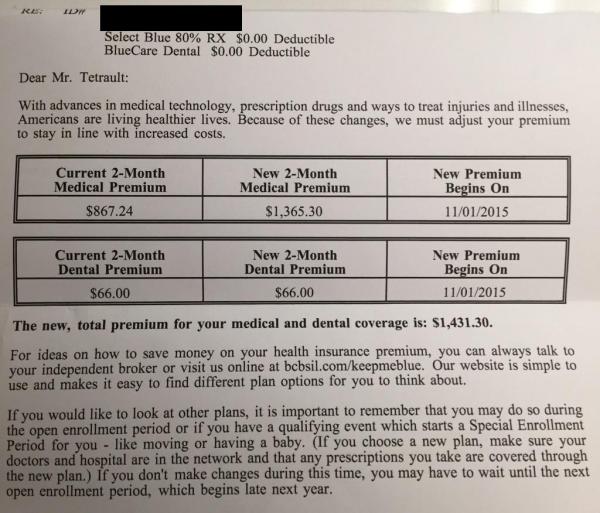
OBAMACARE IS A DISASTER: CO-OP INSURERS ACROSS AMERICA ARE COLLAPSING, AND NOW THERE IS FRAUD
Tyler Durden
Two weeks ago we reported [9]that in what at the time was still a rather isolated incident, Colorado's largest nonprofit health insurer (aka co-op), Colorado HealthOP is abruptly shutting down, forcing 80,000 Coloradans to find a new insurer for 2016.
At the time, we said that the health insurer had been decertified by the Division of Insurance as an eligible insurance company because the cooperative relied on federal support, and federal authorities announced last month they wouldn't be able to pay most of what they owed in a program designed to help health insurance co-ops get established.
In other words, one of the 24 co-ops funded with Federal dollars and created to give more policyholders control over their insurers - especially those who wished to stay away from various corporate offerings, had failed simply because the government was unable to subsidize it: the same government that spends $35 billion in global economic "aid [10]" but can't support its most important welfare program.
Fast forward to today, when we learn that another co-op, this time New York's Health Republic Insurance - the largest of the nonprofit cooperatives created under the Affordable Care Act - is not only shuttering, but was engaging in fraud.
The fate of Health Republic Insurance [11]was first revealed a month ago when the WSJ reported [11]it would shut down after suffering massive losses "in the latest sign of the financial pressures facing many insurers that participated in the law’s new marketplaces."
The insurer lost about $52.7 million in the first six months of this year, on top of a $77.5 million loss in 2014, according to regulatory filings. The move to wind down its operations was made jointly by officials from the federal Centers for Medicare & Medicaid Services; New York’s state insurance exchange, known as New York State of Health; and the New York State Department of Financial Services.
In a statement, Health Republic said it was “deeply disappointed” by the outcome, and pointed to “challenges placed on us by the structure of the CO-OP program.”
Health Republic has about 215,000 members, with about half holding individual plans and half under small-business coverage, a spokesman for the insurer said.
Today we learn that not only was this largest Co-op insolvent, it had also committed fraud. According to Politico [12], the collapsing insurance company that is creating headaches for hundreds of thousands of New Yorkers, misled state and federal officials about its finances, and will not be able to remain in business through the end of the year as originally hoped.
Because incompetence is one thing, but corruption: now that's real government work, right there.
The accelerated wind down is clearly a problem: the more than 200,000 customers insured with the co-op will lose their coverage Dec. 1, and must find a new plan by mid-November, according to the state and federal government. Health Republic insures about 20 percent of the state's individual market.
As Politico adds, the plan had been for Health Republic to make it through the end of the year. As recently as last week, company officials said there was enough in cash in reserve. But that apparently wasn't true.
Health Republic's finances are "substantially worse than the company previously reported in its filings," according to the state Department of Financial Services, which oversees insurance in New York, and the Centers for Medicare and Medicaid Services.
One wonders just how much of the over $100 million "lost" in under two years was due to incompetence, and how much due to pure embezzlement by the co-ops operators. Somehow we doubt we will find the anwer where this taxpayer money has gone.
This does, however, lead to a more serious question: the implosion of Health Republic is merely the latest in what has become an epidemic of governmental failure. In fact, there are a total of ten co-ops, all of which were created by the Affordable Care Act and seeded with billions in federal funding, that have now failed, leading to questions whether the entire business model underpinning Obamacare is unsustainanble for everyone but a select few corporations.
For some more thoughts on this disturbing, if perfectly predictable epidemic, we go to Forbes' Edmund Haislmaier who answers "Why Obamacare Co-Ops are failing at a rate of nearly 50%" [13]
Cooperative health insurers (or co-ops) created under a federal grant and loan program in the Affordable Care Act seem to be falling like dominoes.
It started in February, when CoOportunity Health, which operated in Iowa and Nebraska, was ordered into liquidation. In July, Louisiana’s insurance department announced it was shuttering that state’s co-op. The following month brought news that Nevada’s co-op would also close. On September 25, New York ordered the shutdown of Health Republic Insurance of New York, which had the largest enrollment of all of the co-ops. Then, within the space of a week in mid-October, the number of failures doubled from four to eight, as state insurance regulators announced that they were closing the co-ops in Kentucky, Tennessee, Colorado, and one of the two in Oregon. Last week came news that South Carolina’s co-op will be closed, followed this week by the announcement that Utah’s co-op is also being shut down.
In sum, of the 24 Obamacare co-ops funded with federal tax dollars, one (Vermont’s) never got approval to sell coverage, a second (CoOportunity) has already been wound down, and nine more will terminate at the end of this year.
So what is behind this, so far, 46 percent failure rate?
To start with, the program was a congressional exercise in not merely reinventing the wheel, but doing a bad job of it.
Far from being a new idea, member-owned insurance companies—called “mutual” insurers—have a long history. For instance, life insurer Northwestern Mutual has been in business for over 150 years. Health insurers organized as mutual companies include, among others, Blue Cross plans in 10 states. Indeed, one of them, Florida Blue, converted into a policyholder-owned mutual company just last year. If having more health insurers owned by their policyholders was the goal, then there was no need for federal government action.
On the other hand, if the goal was to increase competition by stimulating the creation of new health insurers, then the ACA’s co-op program was, like other parts of the legislation, badly designed.
* * *
The program offered federal loans and grants to startup insurers but required that they be non-profits, not have anyone affiliated with an existing health insurer on their boards, and not spend any of their federal funding on marketing.
Co-ops are also subject to another provision of the ACA requiring all health insurers to pay out in claims at least 80 percent of premium revenues, or refund the difference to policyholders. By law, insurers can retain no more than 20 percent , out of which they must fund sales and administrative costs before booking any remainder as free cash. That significantly constrains a non-profit carrier’s ability to accumulate capital needed for growth, as it can’t raise funds through equity or debt offerings.
As if that wasn’t daunting enough, the law also required co-ops to focus “substantially all” of their activities on offering health insurance in the individual and small group markets—just as other provisions of Obamacare were thoroughly disrupting those markets by imposing new rules on insurers and complicated new payment arrangements for many of their customers.
Given all of the foregoing, 10 co-ops failing within two years is less surprising than the fact that 23 of them actually got to market in the first place.
As we pointed out two weeks ago, following this avalanche of failures, it will merely force even more individuals into plans offered by corporations, who as a result of the failure of their co-op competitors will have even more pricing power and premium hiking leverage.
Which means that "sticker shockers" such as the one below kindly informing them their health insurance premiums are rising by 60% crushing any desire to splurge modest "gas savings" on discretionary purchases...
... will only get worse, as the premium increase even more with every passing year, as more Co-Ops fail, as more of the publicly-held insurers merge, and as a single-payer system, one which benefits not taxpayers but a select handful of shareholders, becomes the norm.
Haislmaier's take: "The bottom line: Obamacare has made health insurance costlier and the business of offering it riskier. To survive in that new world, health insurers need to be cautious, or even pessimistic, and hope that their customers can continue to pay escalating premiums. It’s not a pretty picture."
It isn't but what are customers going to do: after all the "Affordable Care Act" is a tax (one which "boosts" GDP every quarter [15] no less) and you must pay it by law; sadly the Supreme Court forgot that when it makes a service mandatory, corporations can charge any price they want.
And that's precisely what they are doing.


